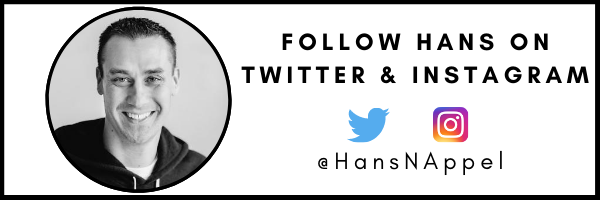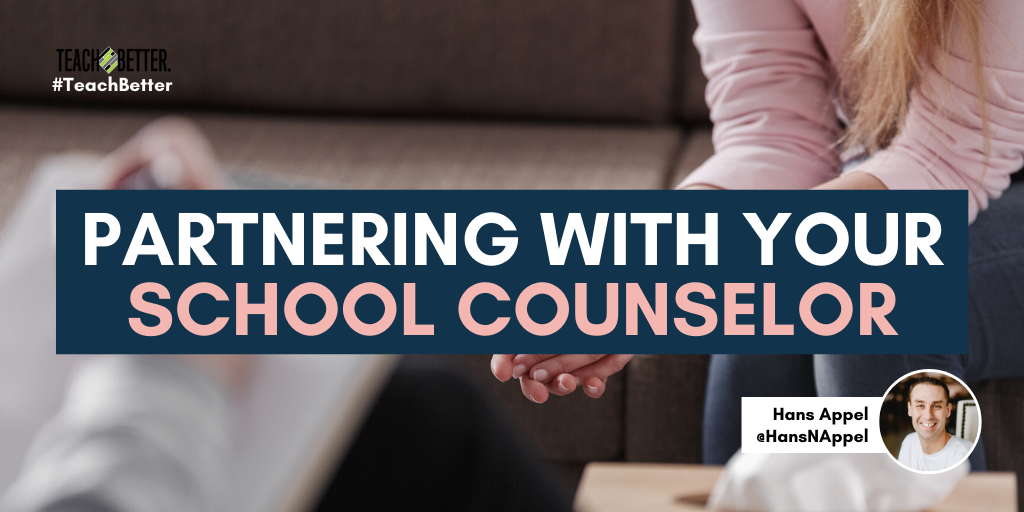TL;DR:
- An overview of school counselors.
- Tips to COORDINATE with your school counselor.
Are you maximizing YOUR relationship with the school counselor? Do you utilize the counselor to support students in the best possible ways? Are you accessing this powerful resource on a regular basis?
“We know where the real work of changing kids’ lives happens…it happens on the ground, in classrooms and communities, in those face-to-face, heart-to-heart interactions and connections between our kids and caring educators and counselors.”
-Michelle Obama
I’m amazed at how many educators don’t truly understand how a school counselor can support the work of a teacher. In truth, it probably falls on us as a counseling group to help educate our school colleagues on how best to use us.
A Brief Overview on School Counselors
According to American School Counselors Association (ASCA), “counselors are certified/licensed educators who improve student success for ALL students by implementing a comprehensive school counseling program.”
Counselors hold a minimum of a master’s degree in school counseling and focus on three main domains:
- Academic achievement
- Social/emotional development
- Post secondary career planning
ASCA recommends an ideal caseload of 250 students per school counselor. But many counselors find themselves (like many other educator groups) overextended beyond best practice workloads. [Here’s a chart on appropriate work duties for counselors].
Regardless, counselors around the world are crushing it, in terms of supporting students, staff, and families.
Award Winning Culture
Award Winning Culture adopts a mindset that all school advocates coordinate their efforts into one student-focused TEAM.
Award Winning Culture adopts a mindset that all school advocates coordinate their efforts into one student-focused TEAM. Click To TweetThe ASCA National Model lays out a beautiful template for counselors to maximize their time while following professional standards.
Work differs by age level (Elementary, Middle, High). But highly effective counselors focus on serving all stakeholders as vital leaders within the school ecosystem.
How might teachers better COORDINATE with these powerful change agents?
C: Collaboration/Consultation
Invite your school counselor to your next PLC, grade level meeting, or parent/teacher conference. They can be an excellent addition to leadership, RTI, or IEP teams. Counselors can offer a unique perspective on students and families that can lead to positive growth.
Stop in for a quick visit, or schedule a more extensive window of time to talk through kids of concern or strategies to support the work you’re already doing in class.
O: Orchestrating
Teachers can access counselor’s expertise in Social Emotional Learning and Character Development that’s approved as best practice through CASEL (Collaborative for Academic Social and Emotional Learning).
Whether this be planning, assessing, and/or teaching the SEL and Character, counselors can support the content work that teachers are doing inside the classroom. Counselors have an active role. They ensure learners pick up soft skills infused into the daily fabric of the school environment, thus becoming CharacterStrong.
O: Outreach
Through referrals to community health and wellbeing resources professional school counselors often have incredible partnerships and relationships with outside agencies. These can can support the Whole Child work from teachers.
R: Rewards/Reinforcement
Counselors can lead PBIS/MTSS and other culture building programs that focus on student incentives, complete with internal and external motivational support. For instance, they might be able to take the lead on PBIS Rewards programs that promote rewarding, tracking, and redeeming positive behavior.
D: Deep Data Dive
Need another set of eyes to look through student data in determining placements, interventions, and supports? Counselors have extensive training in analyzing data. They can be helpful in completing a needs assessment before implementing an action plan.
I: Invitation/Inclusion
Take simple steps. Invite counselors in to observe a student or CC the counselor on a parent/teacher e-mail communication to create an open dialog. This empowers the counselor with the most relevant information possible for decision making, follow through, and guidance.
N: Next Steps
Counselors can help with grade level or intervention transitions, college and career planning, or navigating stuck points for school stakeholders. This might include a home visit, writing a student learning or 504 plan, or helping a student build a resume before practicing job interview skills.
Don’t assume that counselors know which students need extra help transitioning to work based learning, middle school, or general ed classrooms. Be open with your counselor about who he or she needs to intentionally connect with!
A: Awesome Projects
Counselors are not tied to one specific classroom. So they’re perfectly positioned to help with passion projects, activities, extensions, or events that support the work of classroom teachers.
For the past 2 years, I’ve co-led a student leadership podcast, Award Winning Culture. It helps reinforce the work of our leadership teachers.
Whether it’s judging a class competition or facilitating an actual project, counselors can fill a need. If you provide more prep time, they can intentionally schedule fun class activities into their busy weeks.
Share your vision to get your desired support. Then it’s more likely that your counselor can deliver in a big way!
T: Training
Want to learn more about supporting LGTBQ students through Transitioning or Coming Out? Need strategies to help learners with Anxiety and other Mental Health struggles? Want to get educated on Trauma Informed Practices?
Counselors can put on both formal and informal professional development training on a host of topics. This better equips educators within the classroom.
E: Emergency Management
Counselors are experts in crisis support. Whether a student is homeless, being abused, or having a full blown class meltdown, educators routinely trust counselors to lead the way.
But emergency management can also be something to plan and prepare for. Counselors can assist teachers in troubleshooting potential disasters before they happen.
Maybe you’re concerned about an upcoming parent teacher conference and would like to talk it through with someone. You might need a neutral party in the conference. I schedule and participate in all parent/teacher conferences for my students, at my middle school.
Perhaps, you’re going through something personal and need a confidential friendly ear to listen. My teachers regularly reach out to me to chat about challenges in their own lives, families, or world outside of school.
[scroll down to keep reading]School Counselors are allies.
School Counselors should be incredible allies for all educators. Teachers are undoubtedly the most important adult predictor of student success. But they can gain an incredible advantage when they take the time to partner with a professional school counselor.
How might you more effectively lean on your school’s mental health support system? Who is one kid you need to intentionally put on your school counselor’s radar? What will you do to involve your counselor in this week’s mission to build student hope?
COORDINATE BETTER. TEACH BETTER.
About Hans Appel
Hans Appel is an educator, speaker, and writer deeply committed to inspiring the whole child. He’s the author of, Award Winning Culture: Building School-Wide Intentionality and Action Through Character, Excellence, and Community. Additionally, he’s the Director of Culture for the Teach Better Team, co-host of the Award Winning Culture podcast, and the Co-Creator of Award Winning Culture.
Hans is also a member of the Teach Better Speakers Network.




